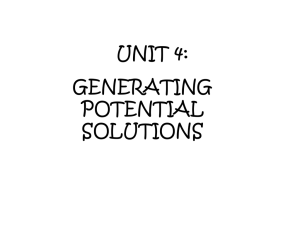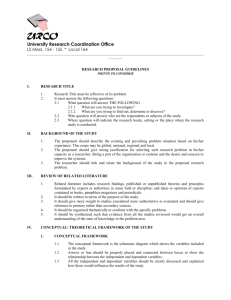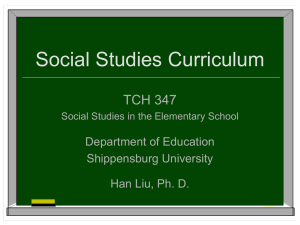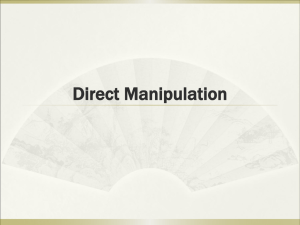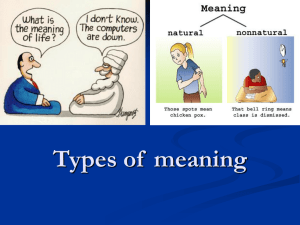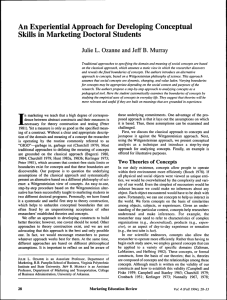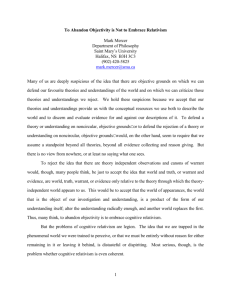Week 3 Literature Review - Welcome to Our Learning Resource
advertisement
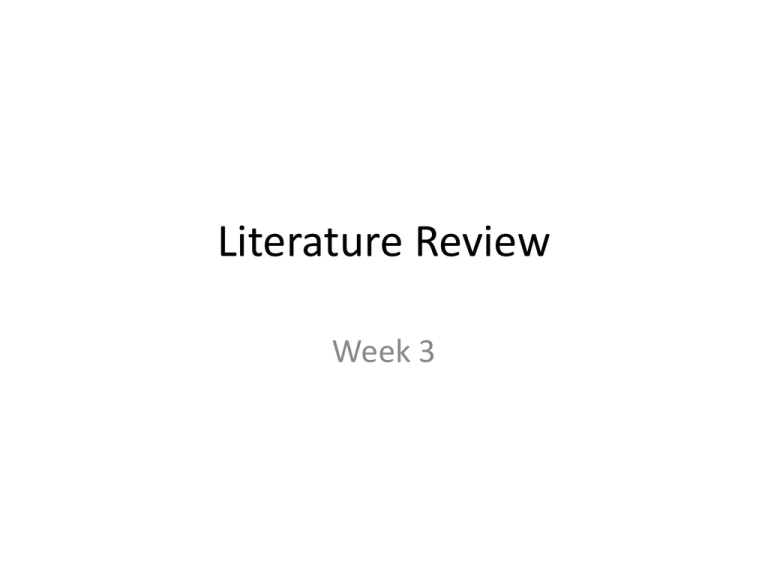
Literature Review Week 3 Last Week • • • • • Research Scope and Scale Problem Definition Formulating a Research Question Defining your Research Aim Specifying Research Objectives • Worksheet 1- Research Description (via email) This Week • • • • • • • • • Introduction-Basics of a Literature Review Purpose of Reviewing Literature What is a Conceptual Framework? Structuring your review Common Faults and Major Pitfall Steps in conducting a Literature Review Sources What is expected at this level? Literature Review- Videohttp://www.youtube.com/watch?v=t2d7y_r65HU Introduction • There is little point in reinventing the wheel • Almost all the time the work or area you want to research may have already been studied by other people, perhaps directly or related. • It follows that if you are to have authoritative knowledge of your research area you must start by reviewing the work of others • Thus enabling you to build on the ideas of existing literature • So essentially a literature review means locating and summarizing the previous studies about a topic • But this is not sufficient at this level • You are required to be CRITICAL of the literature surrounding and related to your research area • hence the term “critically review the literature” • But before you critique you must EXPLORE Exploring the literature • “Any idiot can type a search term into an internet search engine, and many idiots do” Rugg & Petre (2007) what does it mean to ‘explore the literature’? how do you do it? how do you keep track of it? Exploring the literature how do you conduct a professional search? (what do you need to find?) why do a literature search (and subsequent review)? explain to the reader what the problem is explain what approaches have been tried before explain why they failed explain what your approach will be explain the background to your approach the process needs to be comprehensive and systematic … before ‘The Literature’ a word on ‘reading’ • Three challenges … start at page 1, word-by-word, until the end, when you can stop? (how to read) the sheer volume of literature ‘academic-speak’ (specialist language used by academics in that field) • “think of it […] as conducting a kind of treasure hunt” (Levin, 2007) search systematically to discover what there is this is not a Literature Review, this is an exploration so don’t try to master the topic (yet) you’re just starting, so you don’t yet know what is relevant likely to uncover fresh sources only when you are well-advanced will you be able to be properly critical of books and articles “There are no short cuts. Don’t expect anyone else to do this work for you” (Levin, 2007) Literature search some recommendations what you search module reading lists, as a tutor, books & the internet journals, conference proceedings, databases e-Journals (keyword search) Google Advanced Scholar what you search it for how you search it What do we mean by being ‘CRITCAL’ • It means appraising or evaluating a problem with the effective use of language • You need to use your skill of making reasoned judgments and arguing effectively in writing • Read the literature with some skepticism and • Question what you read, question: – The conventional wisdom or tradition – The dominant view/message being portrayed Dees (2003) suggests: • Refer to and assess research by recognized experts in your chosen area • Consider and discuss research that supports and research that opposes your ideas • Make reasoned judgements regarding the value of others’ research • Show how other research may relate to yours • Justify your arguments with valid evidence in a logical manner Blaxter et al (2001) suggests critical writing: • Goes beyond mere description by offering opinions and making a personal response to what has been written • Relates different writings to each other • Does not take what is written at face value • Views research writing as a contested terrain, within which alternative views and positions may be taken up Purpose of Reviewing Literature • What is already known about this area? • What concepts and theories are relevant to this area? • What are the gaps in the existing literature? • Are there any significant controversies? • Are there any inconsistencies in findings relating to this area? • Are there any unanswered research questions in this area? Bottom Line • It will provide the theoretical view through which you will analyze the subject More Importantly • To develop competent knowledge of your subject area so that you can explore the data collected from which theories can be developed and or tested To achieve this you must develop a Conceptual Framework! What is a Conceptual Framework? • Refers to a system of concepts, assumptions, expectations, beliefs, and theories • It explains the main things to be studied, the key factors, concepts, or variables and the presumed relationships among them • It includes the actual ideas and beliefs that you hold about the phenomena studied • This may also be called the theoretical framework • It is primarily a conception or model of what is out there that you plan to study, • It informs you as to what is going on with these things and why i.e. a tentative theory of the phenomena that you are investigating • The function of this theory is to: – inform the rest of your research design – to help you to assess and refine your objectives – develop realistic and relevant research questions • In developing your conceptual framework, you should not simply summarize some body of theoretical or empirical publications, for three reasons: – It can lead to a narrow focus on “the literature,” ignoring other conceptual resources that may be of equal or greater importance for your study – It can degenerate into a series of “book reports” on the literature, with no clear connecting thread or argument – It can lead you to think that your task is simply descriptive Developing a Concept Map • A concept map is a visual display of the theory or theories that is relevant to your study • A picture of what the theory says is going on with the phenomenon that you are researching • A concept map consists of two things: – concepts and – the relationships among these • Concept maps usually require considerable reworking Remember… • That the theoretical view that you take and review must be appropriate to your Research Question and Objectives • That is, the review should in some way assist in answering the research question and • Contribute to achieving the research objectives • So essentially your review should develop a frame around your RQ Structuring your Lit Review General level of knowledge Provide Brief overview of key ideas and themes Summarize, compare and contrast the research of the key writers Narrow down to highlight previous research work most relevant to your own research Provide a detailed account of the findings and show how they are related Highlight those aspects where your own research will provide fresh insights Structuring Cont’d • The idea is that you try to funnel your discussion • Start with a broad discourse i.e. general • Then drill down to the key work which is most appropriate to answering your research question (well as much of an answer as you can get) • Most importantly organize your discussion according to a THEME, sort of like telling a story Presenting Literature • Good reviews develop a story, i.e. a clear and compelling framework around which the writing is structured • You must determine the basic story you want to tell • Storytelling is an important component to the way the author position themselves in relation to the literature Two Processes to convey Literature 1. Constructing Intertextual Coherence- the author shows how contributions to the literature relate to each other and the research – Synthesized Coherence- puts together work that is generally unrelated, i.e. theory and research regarded as unconnected and are pieced together – Progressive Coherence- portrays the building up of an area of knowledge around which there is considerable consensus – Non-Coherence- there have been many contributions but there is considerable disagreement among practitioners 2. Problematizing the Situation- the literature is subverted by locating a problem. – Incomplete- the existing literature is not fully complete, there is a gap – Inadequate- the existing literature has overlooked ways that can improve our understanding of it; alternative frameworks can then be introduced – Incommensurate- alternative perspective is superior to the literature as it stands. It portrays the existing literature as wrong. A useful technique Concept/Theme A My Notes Source Author Evidence from Source Concept/ Theme B My Notes Source Author Evidence from Source Structure On Paper • Introduction- start strong by bring relevance to the topic area, outline the key aspect that will be reviewed • Body- this is were you build up the conceptual framework, review the key concepts and theories • Summary- here you summarize your framework, convey and highlight the concepts that were central to analyzing your subject Steps in Conducting a Lit Review 1. Begin by identifying key words 2. With these keywords begin searching books, journals, online databases etc 3. Initially try to locate as many as you can, reports of research articles or books related to your topic 4. Skim this initial group of articles or chapters and duplicate those that are central to your topic 5. As you identify useful literature, begin designing a Conceptual Map. This is a visual picture of groupings of literature on the topic Steps Cont’d 6. As you put together the conceptual map, begin to draft summaries of the most relevant articles, so that they can be combined into the final literature review 7. After summarizing the literature, assemble the literature review, structuring it thematically or organizing it by important concepts Common Faults • • • • • • • • • • No theme connecting all the elements together Too narrow a view of the topic area Only a justification for the research idea is given Repeating the same materials several times Too few sources used A narrow range of sources is used i.e. only internet sources Poor use of citations No student content and the work relies entirely on the quotation or paraphrase, etc The student has no idea whether they are quoting, paraphrasing, summarising, analysing, etc Plagiarism Major Pitfall • Presenting a mere summary of the articles and books read • Each article or book being given one paragraph • Arrange paragraphs alphabetically in author order • No link or theme between ideas presented by various authors DO NOT DO THIS, IT WILL NOT CONSTITUE BEING CRTICAL Sources Get your hands on: • • • • Academic journals- (peer reviewed) Professional journals Books Electronic Databases – http://libweb.anglia.ac.uk/index.html – http://scholar.google.com – Cambridge Journals Online – Sage (HighWire) – Stay away from Wikipedia and newspapers Evaluating Sources • Make sure that your source can stand on its own i.e. reliable and • It can be validated by the reader • Look for the following: – Currency – Accuracy – Relevance – Authority – Range – Coverage – Objectivity Plagiarism • http://libweb.anglia.ac.uk/referencing/harvar d.htm?harvard_id=65#65 • Activity 5.1 - Create a list of Online Sources that might be useful for your research. So What is expected at this level? • Demonstrate your command of the literature • Clearly cross-examine the literature, bringing out the arguments for and against or the controversy • Distinguish between varying schools of thought and authoritative perspectives • You should be able to reveal the gaps in the existing literature • At the end you should be a ‘Samurai’ in your particular subject matter • Use a good range of high level authoritative sources • You should get to the original work or theory and not rely on the account of other • Remember that the Literature Review is ONGOING In Summary • You will need to – Include key academic theories – Demonstrate current knowledge of the area – Use clear referencing for the reader to find the original cited publications – Acknowledge the research of others • The most important skills are: – The capacity to evaluate what you read – The capacity to relate what you read to other information

